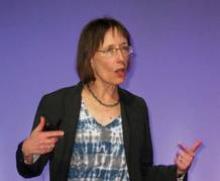DENVER – More than three-quarters of the general public have no idea what palliative care is, according to a national survey. And that, as it turns out, is actually excellent for the field’s future growth prospects, according to one of the nation’s top palliative care specialists.
"This is good news for us. We can create the cognitive frame where there isn’t one already in place," said Dr. Diane E. Meier, director of the Center to Advance Palliative Care and professor of geriatrics and internal medicine at Mount Sinai School of Medicine, New York.
While the public is largely a blank slate with regard to palliative care, nonpalliative care physicians and other health care professionals tend to believe that palliative care is simply end of life care. Many don’t understand that palliative care is actually about relieving the pain, symptoms, and stress of serious illness in patients of any age and at any stage of disease, and that palliative care can be delivered alongside curative or life-prolonging therapies, Dr. Meier said at the annual meeting of the American Academy of Hospice and Palliative Medicine.
The consumer survey sponsored by the Center to Advance Palliative Care and the American Cancer Society involved 800 adults; 70% indicated they were "not at all knowledgeable" about palliative care, and another 8% had never heard of the term. Only 5% were categorized as "very knowledgeable" about palliative care.
Once they were informed about what palliative care truly is, however, survey participants of all political persuasions were very positive about it.
For example, once they were educated about palliative care, 95% of those surveyed said it’s important for patients with serious illnesses and their families to learn about palliative care. Most (92%) indicated they would likely consider it for themselves or a loved one, and an equal percentage said it’s important that palliative care services be available at all hospitals, Dr. Meier reported.
She and other leaders in the palliative care field are now seeking funding for an ambitious 5-year, multimillion-dollar social marketing campaign to increase public awareness regarding palliative care.
"We’ve recognized that we’re not going to see policy change without public support," Dr. Meier said.
Among the policy changes she and her colleagues seek is a big boost in the palliative care workforce, which at present is so small as to constitute a major barrier to access. While there is one oncologist for every 145 patients in the United States with a new cancer diagnosis, and one cardiologist for every 71 patients who have a myocardial infarction, there is just one palliative care specialist for every 1,300 people with a serious illness. And in nearly half of the states, no postgraduate training in palliative care is available.
Dr. Meier would like to see an increased number of physician and nurse practitioner fellowship programs established in palliative care. Another priority is to develop a midcareer board certification track in palliative care across all medical disciplines.
"We have a lot of people coming in from oncology, surgery, and other fields who are seeking work with meaning and purpose," she observed.
Starting in 2013, the specialty will require fellowship training for board certification in palliative care. "Grandfathering in" will no longer be possible.
Dr. Meier reported having no financial conflicts.


